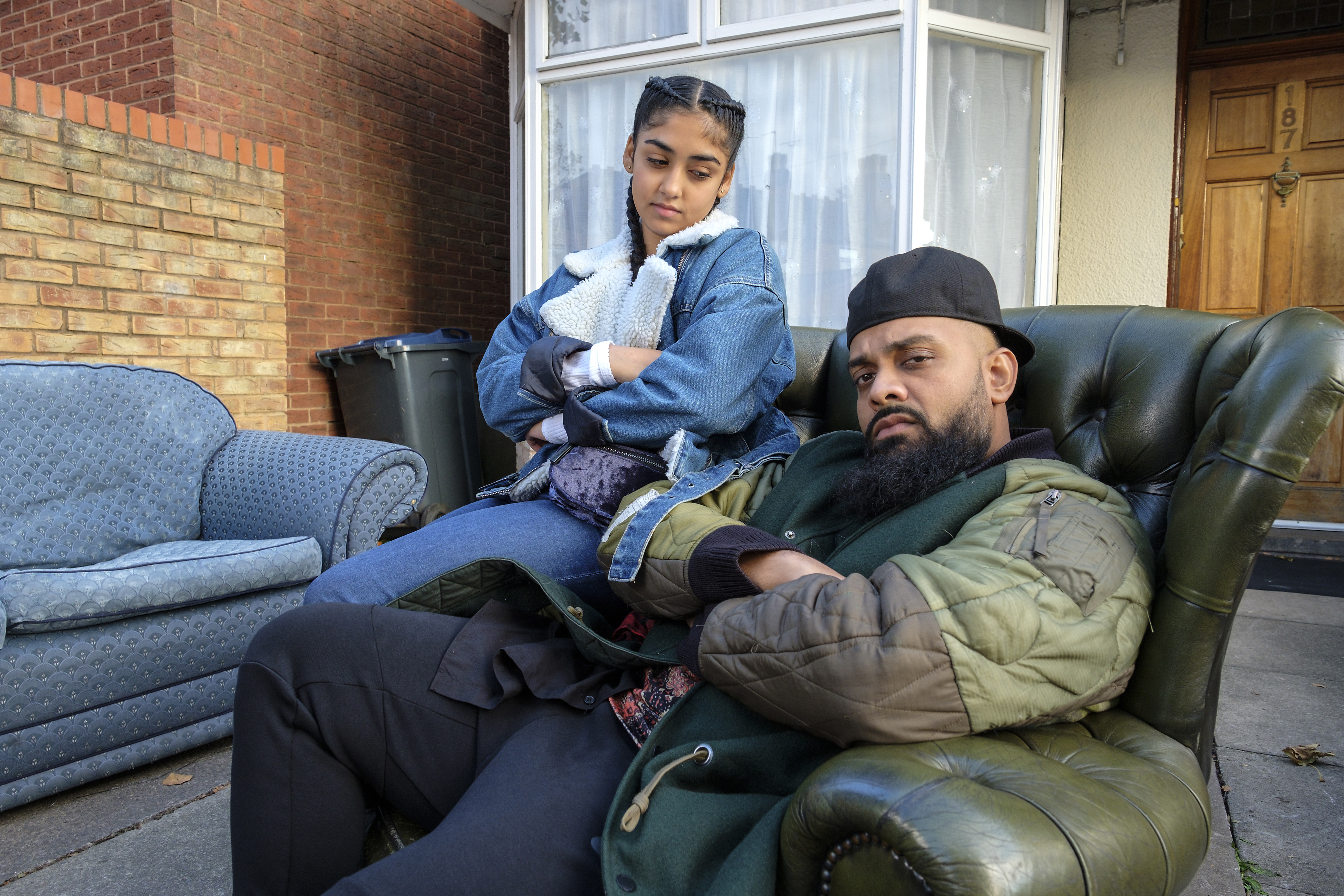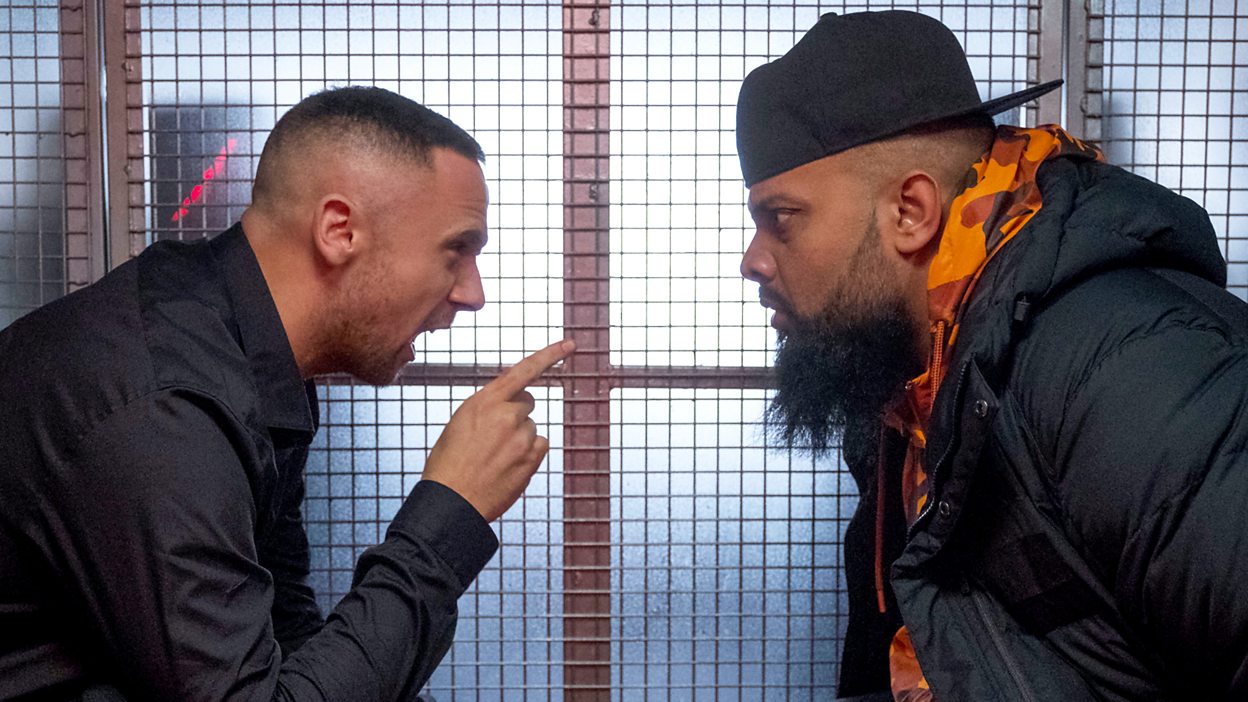
BBC comedy Man Like Mobeen is on a mission to portray powerful South Asian girls and maternal masculinity
Xena Hussain
10 Feb 2019
I’m from Small Heath in Birmingham. An area that has the highest car insurance premium in the nation, a very particular vernacular, and is a notorious “no go zone” according to people like Katie Hopkins, Fox News and, erm… the government, in a report reflecting how the white working classes feel about areas largely populated by immigrant communities. Small Heath has recently been put on the map, with local rapper Jaykae professing his local pride, and Peaky Blinders (of course) as the template to facilitate Londoners practising their Birmingham accents. Growing up, and living here for 19-odd years, I saw people around me from everywhere in the world, a true melting pot, all from minority groups.
Man Like Mobeen is a sitcom set in Small Heath, combining the silliest of humour with positive messages and combatting lazy stereotypes of working-class British Muslim communities. Its debut series launched on BBC Three in 2017 and now it’s been brought back for season two, tackling topics such as knife crime, the NHS, drug dealing and Mobeen’s bad breath. My first run-in with the show came from recognising Guz Khan’s titular character Mobeen on BBC iPlayer, following his viral skit on YouTube, “Pakisaurus”. My next run-in came from my mother, exasperated as to why his BBC crew didn’t select our house to film in, rather than someone else’s from our community on the same road. I decided I had to speak with him.
On arrival at a private members’ club in Soho, ahead of the release of the second series, I wait across a busy cafe/workspace to speak with Guz, as he finishes up with a previous interviewer. The second he is free, we greet each other with exuberant waving across the floor, which sets the tone for the conversation. The first five minutes come across as excitement, as we delve immediately into our shared understanding of such a special place as Small Heath in such a removed setting. “The Genesis story, the origin story is that some of my closest mates are from B10, so I grew up with it, from Charles Road to Monica Road, this is what I grew up around,” Guz tells me. “Some of the funniest people in my life by default are from endz. I’ve never ever seen them anywhere apart from endz.”
“Some of the funniest people in my life by default are from endz. I’ve never ever seen them anywhere apart from endz”
Man Like Mobeen comes across as refreshingly realistic, with a heavy dose of silly humour to shed light on important issues, and mirrors the duality of life in Small Heath. “Mobeen as a character came to fruition as a result of my boys, that lifestyle,” Guz continues. “When I first made that character, he was gonna be those boys, have that vernacular, but he was going to say some real shit. Which is far too often the reverse, you’ll have that accent, that character, but their representation is very one-dimensional. With Mobeen, you are seeing a real person, who is (quite silly) but can conversely swing it out with the leader of the far-right leader in the back of a police van, because that’s what ends is like.” Guz is keen to step away from the caricatured depictions of working-class minorities where they are found working in the corner shop, or as the taxi driver.
We pause for a quickfire round:
Drugs: Bad!
Knife crime: Horrendous
Beans on toast: Whack
Beans on toast as an evening meal: Even whacker
Visiting shisha lounges: Ohoho- Haram brother!
Nasheeds: (laughing) Moist
Drill music: Misunderstood
Theresa May: Weird cyborg
Playing with fire: You might get burnt
Drugs: Still bad
Tea flasks: Covert weaponry (a la series 1)
Stormzy: Talented
Council tax: Shit
UKIP: Divisive
We bring up the topic of authenticity. “First of all, authenticity is key. Everything that’s happened in the show has either happened to myself or someone on my right hand side,” says Guz. “I want people to see the authenticity in the show – they’ve seen it, lived it, they have friends like that – I don’t see that on television.” Although Man Like Mobeen is co-written by Andy Milligan, an Ant and Dec comedy writer who isn’t so familiar with the context of Small Heath, Guz assures me that Milligan is “such a cool guy, he’ll just say ‘I don’t get that’. But what Andy does get, and what I get, is the social message behind it. Andy asked me the dopest question he could ask a writer: ‘What are we trying to say?’”

Still from “H-ALTRight”: image via BBC Three
In the final episode of season one, “H-ALTRight”, Man Like Mobeen confronted the issue of the rise of the right wing. “[It’s] so dangerous and divisive in this country that we need to have an open and frank conversation, in the back of a van, no other distractions, for 12 minutes of that episode,” Guz explains about the central scene in “H-ALTRight” and noting the duty on those in the arts to open up discussion.
This openness is also explored through the identity of Mobeen. His character, Guz explains, forms a portrayal of an imperfect, realistic person torn between two cultures. “The pressures of being a child of diaspora, of living multiple lives, being somebody who clearly could find his own life partner but is pushed by community into arranged marriage,” he says, referencing the episode “Wifey Riddim”, where he gets introduced to a potential spouse. “Mobeen was quite into it, considering, okay, I have a little sister to look after – maybe extra parental support might be sensible.”
Often, masculinity is portrayed as very one-sided, but Man Like Mobeen presents a maternal figure in Mobeen. Although he is the main character, the power lies with Aqsa, Mobeen’s teenage sister, played by Dúaa Karim. “Who’s the boss in that show?” Guz asks, rhetorically. “I was raised by three women, which means I have the shit kicked out of me by three women, which means that I was taught about comedy by three women. In my whole life, all I have known are powerful, strong, active South Asian women. I’ve never seen it on TV though. In comedies and dramas, they are always subservient, victimised, abused. So, you have Aqsa completely dominate Mobeen, former roadman – it’s refreshing, but nothing that’s abnormal to us because as you said, that’s just life.”
“All I have known are powerful, strong, active South Asian women. I’ve never seen it on TV though”
Later, I speak to 16-year-old Dúaa and ask her if she finds any similarities between herself and the character of Aqsa, and she tells me she does, “Because Aqsa is so strong minded, she doesn’t take nothing from nobody. Girls nowadays should be like that, they shouldn’t just sit back and let everything happen. Aqsa is a role model, and that’s what I’d want to be”.
Dúaa cuts a rare figure as a young British child actress with South Asian heritage, and has become quite the role model for other young aspiring desi actors. “On Instagram especially there’s a lot of girls that message me, they’re inspired [by] Man Like Mobeen, because they want to go into acting, but they find it hard to admit it to their parents, and their families”. Last year, she was named best newcomer at the Asian Media Awards.
Between my conversation with both Guz and Dúaa, the theme of support and strength in the women from our communities is apparent. Dúaa tells me that her family “were over the moon! My mum was the happiest mum ever – my mum is my biggest supporter”.
For those from our communities who may not be impressed with the style of comedy, Man Like Mobeen undeniably sends out a powerful, relevant messages, and presents a less one-dimensional view of the characters we encounter daily in Small Heath, whilst championing young talent, and hopefully, opening doors to many more in the future. Dúaa tells me, “Before Man Like Mobeen, I did always say I’d love to get into acting, but I never thought it’d be possible.”
Man Like Mobeen is streaming now on BBC iPlayer and airs on BBC One on Saturday nights








